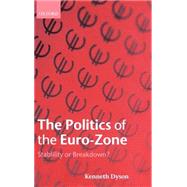The Politics of the Euro-Zone Stability or Breakdown?
, by Dyson, Kenneth- ISBN: 9780199241644 | 0199241643
- Cover: Hardcover
- Copyright: 3/29/2001
The Euro-Zone represents the single most important step in European Integration since 1957 and one of the boldest economic, monetary, and political projects in modern history. In this first major study, the author examines the major political questions raised by the birth of the Euro-Zone onJanuary 1 1999 and argues for a more politically informed analysis and assessment of its nature, operation, and prospects. How does the Euro-Zone operate? What does it mean for European States and for the political strategies of governments? How is its operation to be explained? What are itsprospects for stability? What kinds of policies are needed to strengthen its capacity to withstand crisis? The book stresses the ECB-centric nature of the Euro-Zone and its implications both for policy and polices in Europe and for theories of integration. The ECB emerges as a powerful 'policypusher' and 'ideational leader', with an authority and power exceeding that of the European Commission in the integration process. Dyson examines the elated problems of social justice, democratic consent, and identity. He also argues that the Euro-Zone represents a process of transition to the EU asa 'stabilization Staten An innovative aspect of the book is its application of a strength-strain model for the purpose of analyzing and assessing the stability of the Euro-Zone. It concludes that the stability of the Euro-Zone will be strongly conditioned by three factors: how Kantian rather thanHobbesian or Lockeian its political culture proves to be, with a key reproducibility failing here on the quality of political leadership; its possession of policy interments to tackle liquidity as well as debt traps; and the speed and efficiency of mechanisms of 'bench marking, policy transfer, and'lesson-drawing'.







